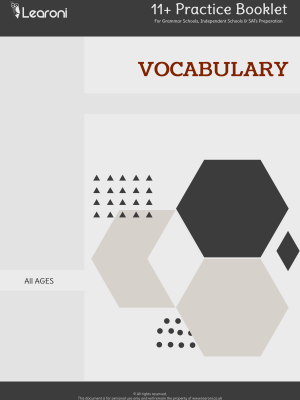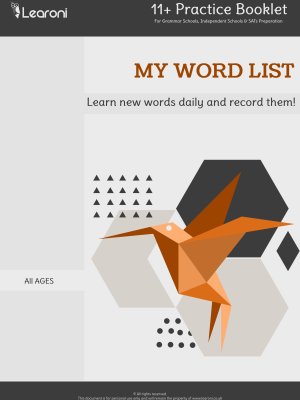Preparing for the 11+ exam can be overwhelming for both parents and children—especially when it comes to building a strong vocabulary. Vocabulary is the foundation for verbal reasoning, comprehension, and creative writing—core components of most grammar school and independent school entrance tests.
In this blog, we’ll explain how a free 11+ vocabulary list can transform your child’s preparation, boost their confidence, and improve their chances of passing the exam. Plus, we’ve included a helpful FAQ section at the end!
📘 Why Vocabulary Matters in the 11+ Exam?
The 11+ exam is designed to test more than just your child’s ability to memorise facts. It evaluates how they understand, interpret, and use language. A rich and versatile vocabulary is essential for success in several key areas:
✅ Verbal Reasoning
Many verbal reasoning questions test synonym and antonym knowledge, word meanings, analogies, and cloze passages. These require a solid understanding of a wide vocabulary.
✅ English Comprehension
Your child needs to understand advanced reading passages and answer inference-based questions. A wider vocabulary improves reading fluency and comprehension accuracy.
✅ Creative Writing
In some regions or schools, children are expected to write stories or descriptive texts. A strong vocabulary allows for richer expression, better sentence structure, and higher-quality writing.
📝 What’s in a Good 11 Plus Vocabulary List?
An effective 11+ vocabulary list should include:
- High-frequency exam words
- Challenging synonyms and antonyms
- Age-appropriate yet ambitious vocabulary
- Definitions and example sentences (if possible)
- Themed word groups (e.g. emotions, settings, actions)
At Learoni, our Free 11+ Vocabulary List is curated by experienced educators and exam experts. It’s designed to give your child the most relevant words they are likely to encounter during the 11+ exam.
🎯 How This Free Vocabulary List Helps Your Child?
Here are some practical ways this vocabulary list supports exam prep:
🧩 1. Makes Verbal Reasoning Easier
A stronger vocabulary helps children solve synonym, antonym, and word association questions more quickly and accurately.
📚 2. Improves Reading Comprehension
Familiarity with a wide range of words enhances understanding of complex texts, helping children answer questions with greater confidence.
✍️ 3. Enhances Creative Writing
Descriptive and precise vocabulary adds flair to stories and narratives, helping your child stand out in writing assessments.
🕓 4. Saves Time in Revision
Instead of wasting hours on random words, this focused list provides a strategic way to master key vocabulary efficiently.
✅ How to Use the 11+ Vocabulary List Effectively
Practice daily: Introduce 5–10 new words a day.
Use flashcards: Great for memorisation and self-testing.
Apply in writing: Encourage children to use new words in short stories or sentences.
Quiz together: Turn it into a fun game with rewards for correct answers.
Use synonyms/antonyms: Teach related words to expand vocabulary naturally.
📥 Download Your Free 11+ Vocabulary List and give your child a competitive edge in their grammar school preparation.
Discover a selection of words from our comprehensive free 11+ vocabulary list.
| Word | Meaning | Synonym | Antonym | Example |
| Abandon | To leave behind or give up | Forsake | Embrace | She had to abandon her plans due to unforeseen circumstances. |
| Ability | The capacity to do something well | Capability | Disability | His ability to solve complex problems impressed his colleagues. |
| Absent | Not present | Missing | Present | He was absent from school yesterday because he was feeling unwell. |
| Accord | Agreement or harmony | Agreement | Disagreement | The two countries reached an accord on trade regulations. |
| Acquire | To obtain or come into possession of | Obtain | Lose | She was able to acquire new skills through dedicated practice. |
| Active | Engaged in physical or mental activity | Energetic | Inactive | Regular exercise is essential for maintaining an active lifestyle. |
| Adapt | To adjust or modify to suit a new situation | Adjust | Remain unchanged | Plants adapt to changes in their environment to survive. |
| Adequate | Sufficient or satisfactory | Satisfactory | Insufficient | We need to ensure that we have adequate resources for the project. |
| Admire | To regard with respect or warm approval | Respect | Disapprove | She admired his dedication to his work and his kindness towards others. |
| Advise | To offer suggestions or recommendations | Recommend | Discourage | I would advise you to consult a doctor if the symptoms persist. |
| Advocate | To publicly support or recommend | Champion | Opponent | She advocates for equal rights for all members of society. |
❓ Frequently Asked Questions (FAQ)
Q1: How many words should my child learn for the 11+ exam?
There’s no fixed number, but most successful students learn between 300–500 high-frequency words over time. Quality is more important than quantity—focus on understanding and usage.
Q2: Is this vocabulary list suitable for all exam boards?
Yes! The list is relevant to GL Assessment, CEM, and independent school exams. While wording may vary slightly, the vocabulary overlaps significantly.
Q3: What age is the list best suited for?
This list is ideal for children aged 9–11, typically in Year 5 and Year 6 preparing for the 11+ exam.
Q4: How often should we revise vocabulary?
Aim for 10–15 minutes per day, integrated into reading, writing, or revision sessions. Consistent, small steps lead to lasting results.
Q5: Can I print and reuse the list for group study?
Absolutely! You’re free to print, share, and use it in home or group learning sessions.
🚀 Final Thoughts
Strong vocabulary isn’t just helpful for passing the 11+ exam—it’s a skill that benefits children for life. By using a targeted vocabulary list, you can help your child learn smarter, write better, and think more clearly.
Download your free vocabulary list today and take the next confident step in your child’s 11+ journey.















